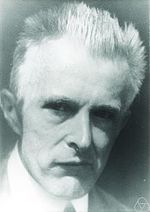Heinrich Scholz, Date of Birth, Place of Birth, Date of Death
TweetHeinrich Scholz
German theologianAbout Heinrich Scholz
- Heinrich Scholz (German: [??lts]; December 17, 1884 – December 30, 1956) was a German logician, philosopher, and Protestant theologian.
- He was a peer of Alan Turing who mentioned Scholz when writing with regard to the reception of "On Computable Numbers, with an Application to the Entscheidungsproblem": "I have had two letters asking for reprints, one from Braithwaite at King's and one from a proffessor [sic] in Germany...
- They seemed very much interested in the paper.
- [...] I was disappointed by its reception here." Scholz had an extraordinary career (he was considered an outstanding scientist of national importance) but was not considered a brilliant logician, for example on the same level as Gottlob Frege or Rudolf Carnap.
- He provided a suitable academic environment for his students to thrive.
- He founded the Institute of Mathematical Logic and Fundamental Research at the University of Münster in 1936, which can be said enabled the study of logic at the highest international level after World War II up until the present day.
Read more at Wikipedia
See Also
- Famous People's Birthdays on 17 December, Germany
- Famous People's Birthdays in December, Germany
- Famous mathematician's Birthdays on 17 December, Germany
- Famous mathematician's Birthdays in December, Germany
- Famous theologian's Birthdays on 17 December, Germany
- Famous theologian's Birthdays in December, Germany
- Famous university teacher's Birthdays on 17 December, Germany
- Famous university teacher's Birthdays in December, Germany
- Famous philosopher's Birthdays on 17 December, Germany
- Famous philosopher's Birthdays in December, Germany
- Famous historian of mathematics's Birthdays on 17 December, Germany
- Famous historian of mathematics's Birthdays in December, Germany


 Date of Birth:
Date of Birth:  Place of Birth: Berlin
Place of Birth: Berlin